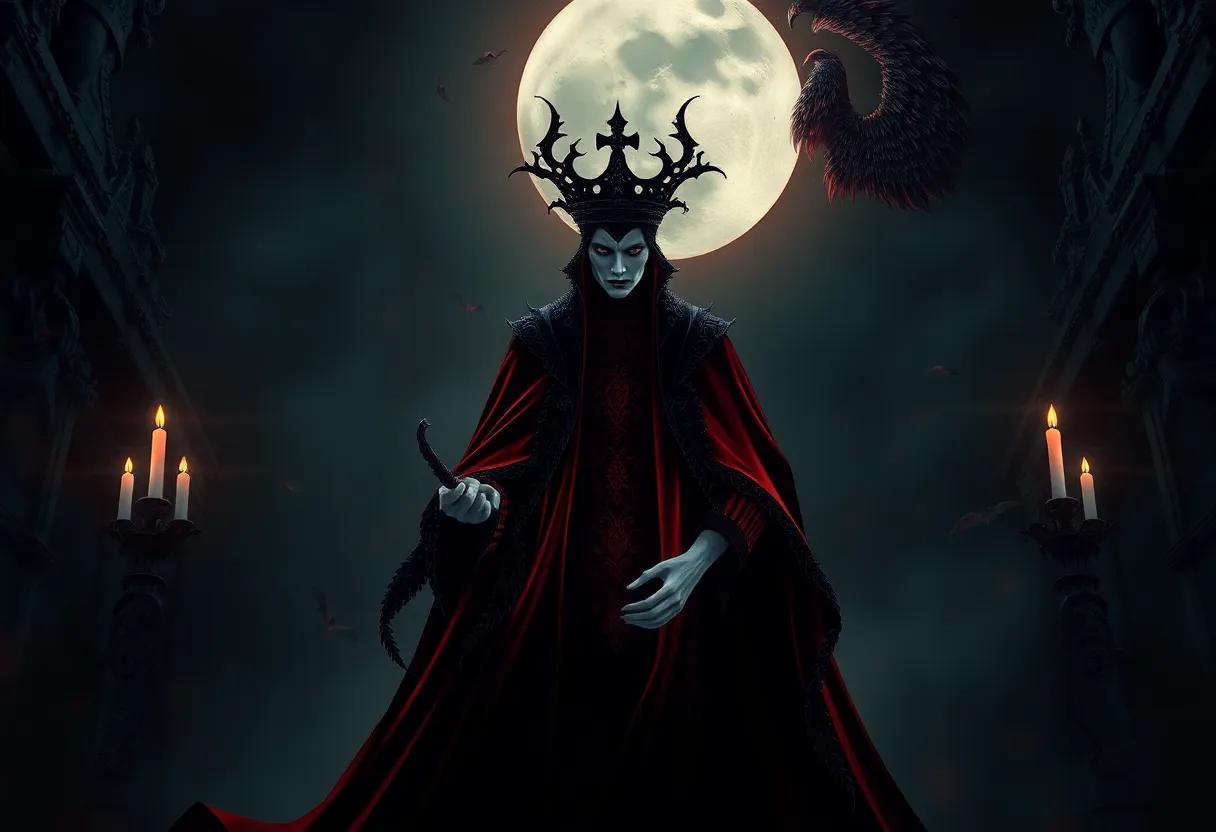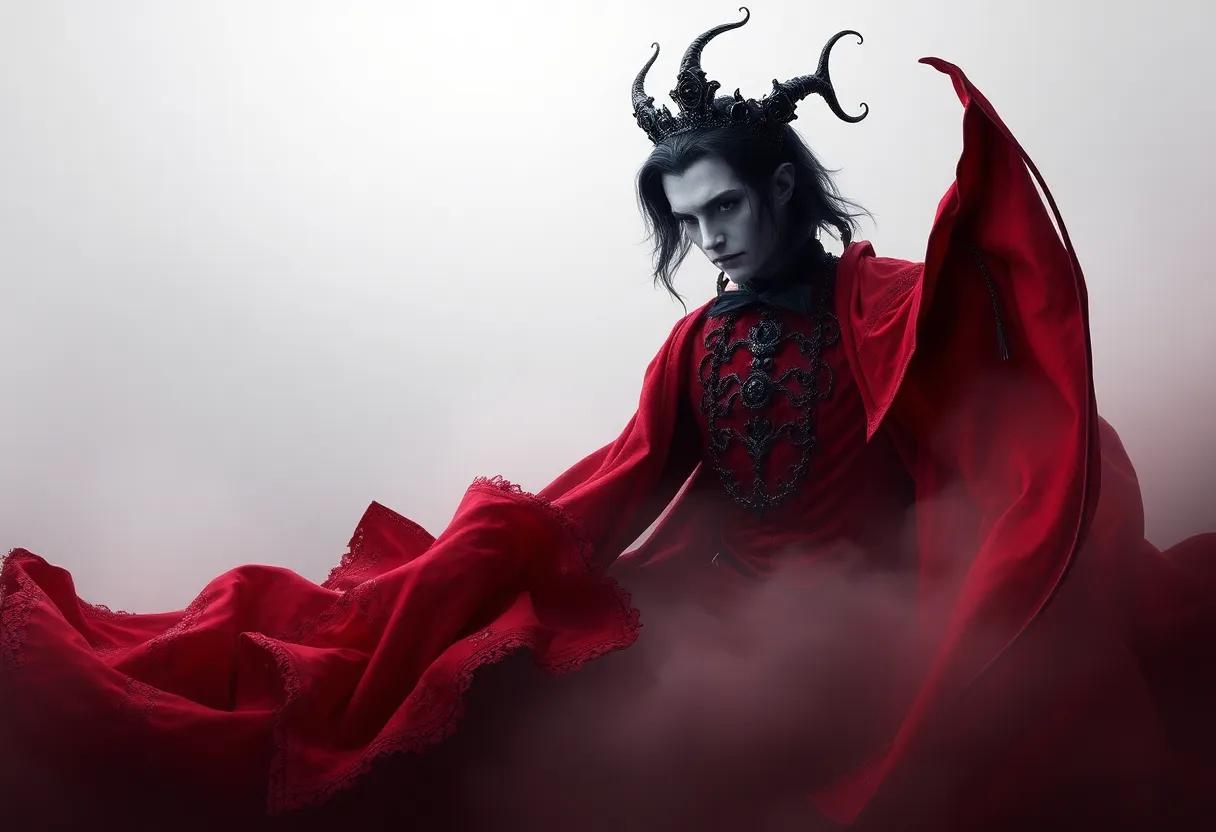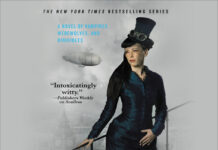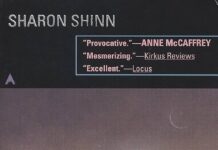In the realm of gothic fantasy and immortal intrigue, few voices resonate as profoundly as Anne Rice’s. With Prince Lestat, Rice revisits the shadowed corridors of her vampire saga, inviting readers back into a world where darkness and desire entwine in relentless dance. This review seeks to peel back the layers of Rice’s latest installment, exploring its themes, characters, and narrative rhythm with a measured eye. As we step once more into the night,we uncover what makes Prince lestat a compelling continuation-or a diverging path-in the legendary series.
Exploring the Gothic Atmosphere and Immersive Worldbuilding that Define Anne Rice’s Prince Lestat

anne Rice masterfully conjures a Gothic atmosphere that permeates every layer of Prince Lestat. From the dimly lit corridors of ancient mansions to the shadow-draped streets of New Orleans, her writing evokes a timeless sense of mystery and melancholy. The novel’s ambiance is steeped in lush descriptions that invite readers to linger in the dark corners where the supernatural and the human world intertwine. This meticulously crafted environment is not just a backdrop but a living, breathing entity that shapes the characters’ desires, fears, and eternal struggles.
Beyond its haunting mood, the worldbuilding in Prince Lestat is an intricate tapestry of history, lore, and mythology. Rice expands the vampire universe with new clans, ancient powers, and cosmic forces that challenge the known order. The novel weaves together elements such as:
Best-Selling Books in This Category
- Secret councils governing vampire society
- Spiritual dimensions that transcend physical existence
- Intertwining destinies that span centuries and continents
These components blend seamlessly, enriching the narrative with depth and complexity while anchoring the supernatural elements in recognizable human emotions and conflicts.
| Element | Impact on Story |
|---|---|
| Dark Mansions | Creates a sense of isolation and grandeur |
| Vampire Clans | Introduces political intrigue and alliances |
| Otherworldly Realms | Expands boundaries of reality and immortality |
Delving into the Complex Character Arcs and emotional Depths of the Vampires in Unveiling the Dark Majesty

The vampires in Prince lestat transcend traditional archetypes, emerging as multifaceted beings whose emotional spectra rival that of any mortal. Anne Rice masterfully peels back layers of immortality and power to reveal vulnerabilities,desires,and fractured loyalties. Characters like Lestat, Marius, and the enigmatic Pandora are no longer mere embodiments of darkness but intricate souls wrestling with identity, faith, and the consequences of their eternal existence. this nuanced portrayal invites readers to empathize with vampires who are as haunted by their pasts as they are driven by their ambitions, crafting a narrative where the supernatural and the profoundly human coexist in uneasy harmony.
What sets these character arcs apart is the deliberate exploration of their emotional evolution over centuries, capturing the immense solitude alongside intoxicating camaraderie that defines vampire life. Through shifting alliances, moments of introspection, and painful revelations, Rice offers a glimpse into their inner turmoil.Below is a breakdown of key emotional traits and transformative journeys that define the principal vampires:
| Vampire | Defining Emotion | Arc Highlight |
|---|---|---|
| Lestat | Rebellion and Redemption | Embracing leadership while grappling with past reckless abandon |
| Marius | Wisdom and Burden | Keeper of secrets, wrestling with the weight of eternity |
| Pandora | Longing and Loyalty | A complex yearning for connection amid despair |
The Intricacies of Anne Rice’s Narrative Style and How it Shapes the Mystique of Prince Lestat

Anne Rice’s narrative prowess lies in her ability to weave lush, immersive prose that mirrors the complex psyche of her immortal characters. The fluidity of her sentences, combined with a lyrical cadence, crafts an atmosphere both haunting and seductive, inviting readers into a world where darkness is as captivating as it is dangerous. Through meticulous layering of ancient context and introspective monologues, Rice elevates Prince Lestat beyond a mere vampire archetype into a symbol of eternal struggle and enigmatic allure. Her narrative voice shifts seamlessly between omniscient narration and intimate confession, allowing the mystique of Lestat to unfold in a multifaceted way that resonates with both empathy and dread.
A closer look reveals distinct storytelling elements that reinforce this enigmatic aura:
- Non-linear chronology: Present events blend with flashbacks, enriching the vampire’s immortal perspective.
- Philosophical musings: Themes of identity, power, and redemption are explored without sacrificing narrative momentum.
- detailed world-building: The lush gothic settings serve as a character unto themselves, amplifying Lestat’s majestic mythos.
| Element | Effect on Mystique |
|---|---|
| First-person introspection | Creates intimacy and vulnerability |
| Rich historical detail | Anchors fantastical elements in reality |
| Symbolic imagery | Enhances the ethereal quality |
Themes of Power, Redemption, and Eternal Loneliness Explored Through the Lens of Rice’s Dark Fantasy

Anne Rice masterfully navigates the turbulent currents of power and its consequences throughout the narrative, portraying it as both a seductive force and an isolating burden.The vampires in Prince Lestat embody a duality – their supernatural dominance elevates them above mortals,yet together ensnares them in a cycle of detachment and existential sorrow. This tension manifests in protagonists who wield immense influence but grapple with the hollow echoes of control, painting power as a double-edged sword that blurs the line between authority and vulnerability. Rice’s exploration compels readers to consider how the allure of dominance can corrode empathy, leaving rulers trapped in vaults of eternal loneliness.
Redemption,on the othre hand,pulses through the narrative as a haunting aspiration – an elusive sanctuary in an age-old darkness. Through the eyes of Lestat and his kin, the quest for forgiveness and inner peace is portrayed with profound nuance, highlighting the complexity of seeking salvation in a cursed existence. Moments of tenderness and regret are interwoven with the characters’ immortal struggles,drawing attention to the delicate balance between sin and salvation.The table below encapsulates key emotional themes and their manifestations, offering a snapshot of how Rice’s dark fantasy contemplates the human condition beyond the veil of immortality:
| Theme | Manifestation | Emotional Impact |
|---|---|---|
| power | Control over others, supernatural command | Isolation, existential dread |
| Redemption | Longing for forgiveness, moral introspection | Hope tempered with despair |
| Eternal Loneliness | Immortality as endless solitude | Melancholy, profound solitude |
Unpacking the Mythological and Historical References Woven Throughout the Prince Lestat saga

Anne Rice’s Prince Lestat masterfully entwines an intricate tapestry of mythological and historical allusions that breathe depth and gravity into its narrative. From ancient Egyptian lore to Christian symbolism, Rice revives familiar archetypes and legends, reshaping them through the prism of vampiric lore. The series doesn’t just flirt with myth; it immerses readers in a hidden world where the origins of vampires intersect with grand mythic traditions, making Lestat’s journey feel both timeless and monumental. The subtle inclusion of figures like Osiris and the concept of the Underworld enrich the existential struggles of the characters, while fragments of Renaissance history ground the vampire chronicles in tangible epochs, adding an extra layer of realism to their eternal saga.
Delving into these rich narratives reveals how Anne Rice carefully constructs allegories that highlight themes of immortality,redemption,and power.The symbolism within Prince Lestat frequently enough echoes the eternal human quest for meaning amidst darkness and chaos. Consider the following elemental motifs and their narrative significance:
- The Phoenix: Signifying resurrection and cyclical rebirth,mirroring Lestat’s own transformations.
- Blood Rituals: echoing ancient rites that emphasize sacrifice and communion.
- The Serpent: A dual symbol of knowledge and temptation that threads through various vampire characters’ arcs.
| Reference | Origin | Narrative Role |
|---|---|---|
| Osiris | Ancient Egyptian Mythology | Symbolizes death and resurrection, emphasizing vampire immortality |
| Crucifix Imagery | Christian symbolism | Explores conflict between vampire nature and moral conscience |
| Prometheus | Greek Mythology | Represents rebellion and the gift of forbidden knowledge |
The Role of Dialogue and Philosophical Musings in Creating a Reflective and Thought-Provoking Narrative
Anne Rice deftly employs dialogue not merely as a mechanism to reveal plot or character, but as a conduit for profound philosophical exploration. The conversations between her vampires transcend typical supernatural banter, evolving into fertile ground where existential questions take root and flourish. Through these exchanges, themes of immortality, morality, and identity are interrogated with an intimacy that invites readers to ponder the nature of their own existence. Notably, the interplay between Lestat and his counterparts feels less like scripted lines and more like rich, spontaneous discourse, mirroring the complexity of human reflection in immortal forms.
Embedded within the narrative fabric, the philosophical musings serve several key functions:
- Encouraging introspection: They gently urge readers to question the constructs of good and evil.
- Enhancing character depth: By exposing inner turmoil and doubt, the story elevates beyond genre tropes.
- Creating thematic cohesion: These thoughtful ruminations knit together disparate plot threads into a unified meditation on existence.
| Dialogue Element | Philosophical Insight |
|---|---|
| Lestat’s defiance | Assertion of free will despite eternal destiny |
| Reyes’ despair | Contemplation of suffering and redemption |
| Mona’s reflections | Search for meaning in an immortal life |
Balancing Horror and beauty: How Anne Rice Crafts a Unique Tone in the Vampire Chronicles Series
Anne Rice’s mastery lies in her ability to intertwine the chilling and the graceful, creating a tapestry where horror is laced with an almost poetic beauty. Her vampires don’t simply evoke fear; they embody a majestic complexity that fluctuates between monstrosity and artistry. This duality invites readers to explore deeper themes such as immortality, loneliness, and desire, wrapped in lush, evocative descriptions that elevate even the darkest moments into something hauntingly sublime. The rhythmic cadence of her prose ofen mirrors the undulating shadows of her nocturnal world – both alluring and threatening, drawing the reader into a liminal space where terror coexists with exquisite elegance.
Within the pages of the Vampire Chronicles,this delicate balance is reinforced by recurring motifs that highlight the contrast between light and darkness. For example:
- The juxtaposition of vampire vulnerability and their predatory nature
- Settings that showcase Gothic grandeur alongside brutal, visceral violence
- Characters that wrestle with existential anguish yet exhibit timeless dignity
Such elements are carefully woven through intricate narratives, much like the layers of a rich tapestry. This interplay not only intensifies the atmospheric tension but also allows Rice to craft a tone that is unique within vampire fiction – one that honors traditional horror while simultaneously elevating it into a realm of melancholic beauty and philosophical depth.
| Element | Horror Aspect | Beauty Aspect |
|---|---|---|
| Vampire Physiology | Predatory, terrifying fangs and claws | Graceful agility and immortal allure |
| Setting | Dark crypts and shadowed alleyways | Ornate mansions and lush, eerie landscapes |
| Emotions | Relentless hunger and rage | Sorrowful reflection and eternal yearning |
Assessing the Pacing and Structural Choices That Impact Reader Engagement in Prince Lestat
Anne Rice’s Prince Lestat masterfully orchestrates a tempo that swells and recedes like the eternal night it explores. The novel embraces a contemplative rhythm, allowing moments of introspection to linger just long enough before plunging readers into a labyrinth of intertwining subplots and vivid character arcs. This ebb and flow are intentional, offering neither a relentless sprint nor a sluggish crawl, but a delicate balance that reflects the complexity of immortal existence. Rice’s choice to intersperse evocative, detailed passages with swift narrative turns keeps the engagement alive, though occasional digressions into backstory may test the patience of readers craving forward momentum.
Structural decisions also play a crucial role in how the story resonates:
- Fragmented viewpoints: Switching among various vampire perspectives enriches the narrative but demands attentive reading.
- Layered timelines: Flashbacks woven within present-day events deepen context yet risk narrative diffusion.
- Interlacing myth and reality: Blending historical lore with fantastical elements amplifies immersion but can complicate pacing.
| structural Element | Impact on Engagement | Reader response |
|---|---|---|
| Multiple POVs | Enhances depth and variety | Mixed; immersive yet sometimes disorienting |
| Non-linear timeline | Creates mystery and reveals past | Generally positive; can slow pacing |
| Evocative descriptive passages | Builds atmosphere and mood | Appreciated but may feel dense |
Recommendations for fans of Gothic Literature and Supernatural Stories Seeking a Rich, Multi-Layered Read
For those enchanted by the shadowed corridors of Gothic literature and the eerie allure of supernatural tales,diving into Prince Lestat offers an immersive plunge into a universe where darkness breathes complexity. Anne Rice weaves a tapestry of characters whose immortal struggles echo the quintessential themes of identity, power, and redemption. This novel does not merely rest on atmospheric suspense but invites readers to explore the philosophical undercurrents beneath its blood-soaked surface. Expect labyrinthine narratives softened by moments of poetic introspection and vivid world-building that enrich the vampire mythos in unexpected ways.
Recommended reads to accompany your journey into Anne Rice’s luminous darkness:
- “The Monk” by matthew Lewis: A controversial classic drenched in psychological torment and supernatural horrors.
- “Mexican Gothic” by Silvia Moreno-Garcia: A contemporary Gothic tale blending eerie family secrets with lush, sinister landscapes.
- “The vampyre” by John Polidori: The foundational vampire narrative that inspired generations, filled with Gothic melancholy and suave menace.
- “something Wicked This Way Comes” by Ray bradbury: A dark fantasy that balances nostalgia and the terrifying unknown with lyrical prose.
| element | Why It Resonates |
|---|---|
| Complex Protagonists | Highlighting moral ambiguity & eternal conflict |
| rich Symbolism | Layered meanings that ignite deeper reflection |
| Atmospheric Settings | Gothic locales that evoke unease and wonder |
| Philosophical depth | Questions of existence, purpose, and immortality |
How Prince Lestat serves as a Continuation and Reinvention Within Anne Rice’s beloved Vampire Universe
Anne Rice’s Prince Lestat marks an audacious evolution within her legendary vampire canon, blending the familiar mystique with fresh narrative dimensions. Lestat, as the enigmatic figurehead, is not merely a resurrected icon but a carefully crafted bridge connecting the eerie depths of Rice’s past novels with modern existential questions that resonate deeply with contemporary readers. This installment deftly expands the lore, introducing new complexities in vampire society that challenge the previously defined hierarchies and traditions, weaving a tapestry where aged bloodlines confront unprecedented dilemmas. In doing so, the book offers a rejuvenated perspective that honors the original mythos while inviting readers to reconsider the essence of immortality, power, and identity.
In the spirit of reinvention, Prince lestat reconfigures familiar archetypes through:
- New voices: fresh characters whose motivations add layers to the classic vampire struggle
- Shifting alliances: dynamic relationships that redefine loyalty and betrayal within the undead
- Philosophical introspection: existential themes that elevate the vampire mythos beyond horror into profound human reflection
These elements culminate in an experience that challenges readers to embrace ambiguity and conversion, reflecting how Rice’s own storytelling evolves without losing the dark majesty that has captivated audiences for decades.
| Aspect | Traditional Lore | Prince Lestat’s Innovation |
|---|---|---|
| Vampire Hierarchy | Rigid and aristocratic | Fluid and contested |
| Character Focus | Isolated anti-heroes | Community and conflict |
| Themes | Darkness and curse | Redemption and identity |
The Cultural and Literary Impact of Anne Rice and Her Enduring Influence on Vampire Fiction
Anne Rice’s contribution to vampire fiction transcends simple storytelling; she redefined a genre that was once confined to gothic shadow and lurid clichés. through her vivid prose and deeply philosophical musings, Rice transformed vampires from monstrous villains into complex, tortured anti-heroes with elegant sensuality and profound existential dilemmas. This shift not only sparked a renaissance in horror literature but also opened up new avenues for exploring themes such as immortality, identity, and redemption.Her work carved out a unique space where mythology and human emotion intersect, making vampires emblematic of broader human experiences-loneliness, desire, and the search for meaning.
Her enduring influence is visible across a myriad of contemporary vampire narratives, inspiring writers and filmmakers to approach the undead with a more nuanced lens. The legacy of Anne Rice can be distilled into a few key contributions:
- Complex Characterization: Vampires portrayed as introspective beings grappling with morality.
- Gothic Romanticism: A lush, atmospheric style blending horror with elegance and sensuality.
- philosophical Depth: Integration of existential and metaphysical questions into vampire lore.
- Expanded Mythos: Rich world-building that goes beyond traditional vampire tropes.
| Aspect | Impact |
|---|---|
| Character Depth | Humanized supernatural beings |
| Narrative style | Lush, poetic, immersive prose |
| Cultural Relevance | Modernizing vampire myths for contemporary audiences |
| Genre Innovation | Blending horror with romance and philosophy |
reflecting on Anne Rice’s Narrative Voice and Her Contribution to Modern Gothic Storytelling
Anne Rice’s narrative voice possesses a hypnotic cadence, effortlessly weaving sinuous prose with profound emotional depth. Her storytelling transcends mere Gothic tropes by infusing her characters with psychological complexity and existential dilemmas, transforming vampires from simple monsters into tragic antiheroes. This distinctive voice not only captivates readers but also invites them to confront the timeless themes of identity, immortality, and redemption through a lens that feels both intimate and grandiose.
Her contribution to modern Gothic storytelling can be distilled into several defining elements:
- Psychological Realism: Exploring the inner turmoil and desires of immortal beings with unparalleled nuance.
- Rich Mythology: Expanding traditional vampire lore by crafting intricate histories and mythos that span centuries.
- Evocative Atmospheres: Creating sensuous, dark landscapes that function almost as characters themselves.
| Aspect | impact on Gothic Tradition | Rice’s Innovation |
|---|---|---|
| Character Depth | Supernatural beings as villains | Complex protagonists with moral ambiguity |
| setting | Dark castles, foggy moors | Vivid, cosmopolitan and timeless landscapes |
| Themes | Fear and horror | Love, loss, faith, and existential longing |
In the shadowed corridors of Anne Rice’s creativity, Prince Lestat stands as both a gateway and a mirror-inviting readers to explore the tangled legacies of immortality while reflecting on the timeless complexities of identity and power. Weather you are a devoted fan or a newcomer drawn by curiosity, this latest chapter in the Lestat saga offers a rich, contemplative journey filled with elegance and enigma. As the final page turns, one is left not with answers neatly tied, but with a lingering invitation to wander deeper into the dark majesty that only Rice can so hauntingly unveil.













